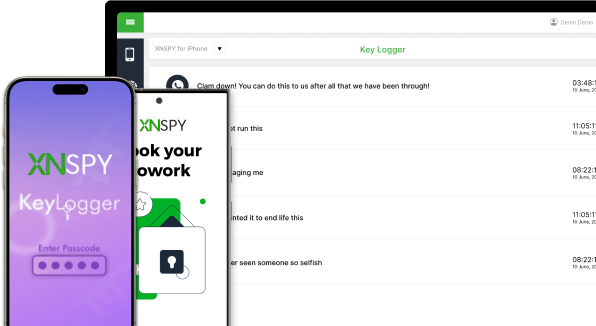The complete monitoring experience for your phone
Get XNSPY and start tracking calls, texts, multimedia, locations and more on any phone!
Get Started Now Live DemoIn every decade that follows, teens tend to develop a particular communication style. Gen Z and Gen Alpha seem to make the most of it. This demographic cohort succeeding the Millenials
differs from their parents on most things, from music to fashion, and particularly the use of language.
It is increasingly common for parents to hear terms and words from adolescents that they have never heard before. Furthermore, most parents have no clue what most of the slang stands for.
Today, even young parents find it hard to keep up with the modern jargon of their teens. The moment you grasp a few words, the kids will estrange you with new slang.
Why Teens Use Slang?
Deciphering the unfamiliar words and coded terms kids use is challenging due to rampant social media activity and digital communication. There is no hiding that kids today are growing up amid technology, making them evolve faster than those kids born two decades ago.
The easy access to phones allows teens to frequently use coded words, shorthand, and social media acronyms when interacting with friends and family.
Teenagers may use slang to assert their identity, express independence, sound cool, and fit into specific social groups. Most coin new terms because they think using their parents’ jargon is old-fashioned and out of touch with modern trends.
Adolescence is a crucial stage in kids’ lives. Almost all want to explore the world outside of home and develop their personalities. This process involves increasing interaction with their peers and, thus, using unorthodox words to define their friendships and even romantic flings.
Just as the kids are evolving, so is the teen slang dictionary for parents. By the time you master a few phrases, the teens may lose charm and replace them with new ones.
The Modern Teen Slang that Every Parent Should Know
Over time, parents have heard many common and strange slang words. These include words and terms such as dope, cringe, goat, Yolo, slay, bae, and stan. Unusual words define the youth culture of every decade. However, these words and phrases are replaced by modern ones by future teens.
You may catch your teen using these latest slang words often. Here is what you need to know about those words.
Rizz
Rizz describes the ability to enchant a romantic partner through charm and style. To rizz up means to attract, seduce, and chat up.
Rizz is one of many such words that teens commonly use. This niche social media term made its way into the mainstream, so much so that it was named ‘Oxford’s Word of the Year’ in 2023. The word is an uncomplex and shortened version of ‘charisma’ and means the same.
Skibidi Toilet
Skibidi Toilet is a word used about the Skibidi song, which has gone viral after being featured on social media, particularly TikTok. After becoming popular in the dancing videos, the Skibidi song was remixed with Timbaland’s song ‘Give It to Me’ and became a new version.
YouTuber DaFuqBoom used this in a short animated series in which spooky heads emerge from the toilets. The story reflects a dystopian setting in which Skibidi Toilets (with human heads) are at war with other heads representing televisions, speakers, and CCTV cameras.
Fanum Tax
YouTuber and Twitch streamer Kai Cenat popularly used the slang ‘fanum tax’. He often used the term ‘tax’ whenever he or any guest took a bite of food during a streaming session.
In a particular clip, another Twitch streamer, Fanum barged into the room, yanked a cookie Kai was holding, and left the room. It was then that fans and viewers started to call it ‘Fanum tax.’ The slang is now used when anyone wants to yoink or snatch away what you are having without permission.
Ohio
Lately, you may have heard your teen saying only in Ohio or Give me your Ohio, and you may scratch your head at what that means. Ohio is one of the states of the USA, and the word also means ‘Good Morning’ in Japanese.
The US state did get into the limelight a couple of years ago because of some strange things happening there. Later, teens started to have a ball of it and made up several memes and snippets to mock the state. Ohio is now referenced as another word for creepy and weird.
Sigma
Sigma males are defined as the epitome of masculinity who have broken the dynamics of alpha and beta males. They are outcasts who operate without a pack. Sigma males are successful and famous but also quiet and rebellious.
Having a sigma male personality is making rounds on social media, and hundreds of memes about it are circulating on TikTok. The term is widely used by tech aficionados who are not only following the hustle culture but also making gains at the fitness club.
Gyatt
‘Gyatt’, or ‘gyat’, is a slang word that means surprise, eagerness, and wonderment. This term is a short form of the phrase ‘God Damn.’ Gyat was first used by Twitch streamer Kai Cenat as an exclamation to his reaction to seeing a voluptuous or curvy woman. The viewers replicated his behavior and spam gyat when conversing in chat.
The slang quickly blew up on social media platforms, and teens casually use this term when referring to curvaceous women.
Sus
Sus is an abbreviated form of the word ‘suspicious.’ Teenagers use the word sus when discussing someone or something with questionable and shady motives. The use of the word dates back to the 1920s. However, the game Among Us revived it, and gamers use it for others who act strange and feel like impostors. Gamers did this to stamp their identities as part of a group.
The word sus has branched out of gaming, and youth often use it to call out another person for lying or acting out of character.
Why Parents Need to Monitor Language Teens Use
Teenagers today have sharp and smart minds and do not hesitate to experiment. They may use slang words often, either to sound funny or boast. It is important to consider that many kids may use these words ironically.
However, sometimes, the use of specific terms may indicate risky behavior, including allusions to inappropriate sexual material. Parents need to be vigilant if any of the terms relate to parties, the use of illegal substances, bullying, alcohol, or unprotected sex.
Whether your teen is involved in any inappropriate activity or not, you will want to know more about the slang they are using and what it refers to. Teens’ slang often changes, so it may be confusing to track each one.
Therefore, using the Urban Dictionary is the best approach. It is a popular website that lists the slang words kids use.
The Best Way to Monitor Your Teen’s Communication?!
Knowing about the words your teens utter is one thing, but you may not know how they communicate with friends on social media. It can include a more complex and inexplicable use of slang words and acronyms. One way to track your teen language on instant messaging (IM) apps and social media is by using a monitoring app.
XNSPY is one such app that can help you keep pace with the lingo your teen uses while communicating on their phones. The app offers various features to track the teen’s smartphone usage and app activity.
To get relevant insight and stop the negative influence of slang, you can use the XNSPY’s keylogger and watchlist alerts feature.
Curious About What Slang Your Kids Use to Hide Secrets?
XNSPY reveals everything your kids type anywhere on their phone so nothing remains hidden.

The keylogger records every keystroke the teen makes while sending messages on IM apps such as WhatsApp, Facebook, Instagram, Viber, and Skype. This functionality helps to track their habits and determine whether they are using crude language while texting.
You can further complement this feature by using watchlist alerts, where you can specify certain slang words. Whenever your teen uses them, you will get instant notification.
Conclusion
It’s spectacular how teens have developed a distinctive vernacular with words that encompass online trends and various cultural pools.
Trying to keep up with the everyday slang or acronyms your teen uses can be exhausting. Furthermore, new words are added to the mix each passing day. These jumbled blocks of letters sound and read more gibberish than the ones you spent time understanding.
Learning about modern slang can help you gain better insights into the ever-developing teen communication. Understanding and even using those terms, no matter how funny or uncomfortable they may look, is essential to relating and interacting with your teens.
XNSPY is a great tool to help you do that and can even provide other monitoring features for your children’s safety. Get in touch with us today to see how we can help you with your monitoring needs.


